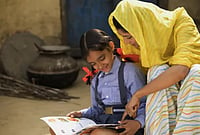“O, thou with a beautiful face, may the child reared on your milk, attain a long life, like the gods made immortal with drinks of nectar.”
So said Acharya Sushruta, the famous physician of ancient India who lived around 7th-6th century BC and is often called the “Father of Indian Medicine”.The poetic line shows the significance of breastfeeding millennia ago.
Breastfeeding provides the ideal nutrition for infants. No effort is too small to create awareness about breastfeeding towards rearing healthy children. Breast milk not only has a nearly perfect mix of vitamins, protein, and fat, it also helps to fight off viruses and bacteria. Apart from all these benefits the physical closeness, skin-to-skin touching and eye contact during breastfeeding strengthen the bonding between mother and child.

(Facebook images on the Poshan anthem launch posted by WCD Minister, Smriti Irani)
Vice President of India, M. Venkaiah Naidu, stated recently during the launch of the POSHAN Anthem, “As adolescent girls are the second window of opportunity in addressing malnutrition, with the first 1,000 days of life being the first window, preventing early marriage of girls, addressing their dropout rate from schools, delaying first pregnancy and adequate spacing between births would greatly contribute to better nutrition. Initiating breastfeeding within an hour of birth prevents neonatal morbidity and helps build immunity after placental separation.”
Naidu emphasised the unfortunate fact that in India only 41 percent of the mothers are able to start breastfeeding within an hour of giving birth. “We must promote breastfeeding to ensure optimal nutrition and reduce the risk of disease among infants. We must also ensure that the Integrated Child Development Service scheme serves proper complementary food to children below two years, and supplementary food to pregnant and lactating women. Anganwadi centres should be the points of convergence for nutrition, health and food security services,” the vice president said.
Time has come when we must think of malnutrition as a social issue and join hands to have healthy children and mothers. In this direction, breastfeeding awareness and promotion campaign can play a major role as it will improve the health of infant children. In the first half of infancy, compulsory exclusive breastfeeding and appropriate complementary feeding are essential.
All over the world, experts strongly recommend breastfeeding for one year—exclusively for six months and another six months with other foods such as vegetables, grains, fruits, proteins etc. This could help give a healthy start to a child as more than 60 per cent children die due to reasons related to malnutrition.
While malnutrition of the mother leads to a child’s low birth weight, in a growing child it causes stunting. It is worrying that 38.4 per cent of children below the age of five are stunted. “Good nutrition is not a choice anymore, it is a prerequisite for new India’s bright future. A nutrition revolution can be brought about by creating village-level women nutrition-warriors or change-leaders,” Naidu stressed.
This statement suggests the importance of women in this campaign as nowadays many mothers are not willing to breastfeed their child because they are not aware of its benefits. There is misconception among them that it leads to sagging of their breast and spoils their physical appearance, which is not true. It is also important that lactating mother should eat a proper balanced healthy diet as the quality of milk depends on mother’s food habit and health.
To sum up with the words of Acharya Sushruta:,”The touch, the sight…and affection causes ejection of milk. Breast milk is naturally clean and sterile, protects from many infections and diseases. It increases the immunity of a child against a variety of bacteria and protect the infant from many diseases.”
Dr Upasana Singh, a historian, social worker and environmentalist, is committed to issues of malnutrition, hunger and women empowerment






.jpg?w=801&auto=format%2Ccompress&fit=max&format=webp&dpr=1.0)
















